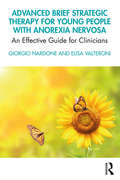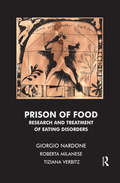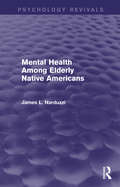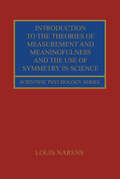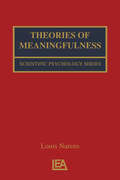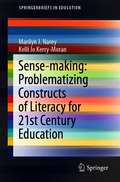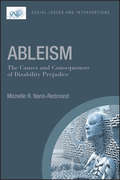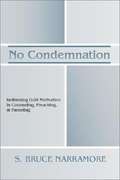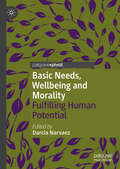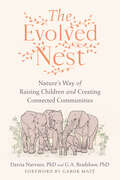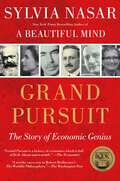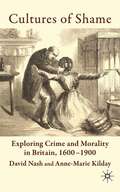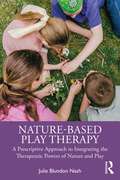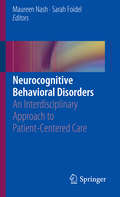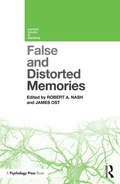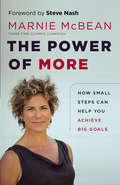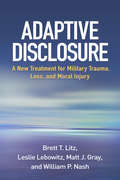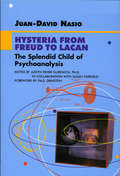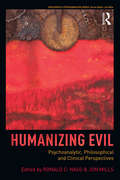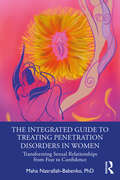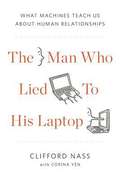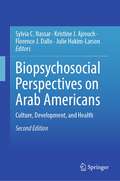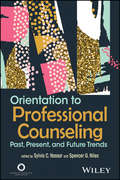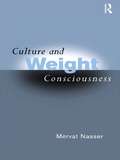- Table View
- List View
Advanced Brief Strategic Therapy for Young People with Anorexia Nervosa: An Effective Guide for Clinicians
by Giorgio Nardone Elisa ValteroniThis important new book details a strategic and systemic model for short-term therapy with adolescent sufferers of anorexia nervosa, a psychopathology that seduces patients into starvation as doctors and family look on with increasing desperation. Supported by the successful treatment of hundreds of cases over the past 30 years, the book is the culmination of a long-term intervention programme developed at the Strategic Therapy Centre of Arezzo, Italy. It begins by outlining the range of different eating disorders, before identifying the specific characteristics that adolescents with anorexia present. The variations of the pathology are then discussed. Not all patients present with the same symptoms; some sufferers over-exercise while others binge eat or self-harm. Substance abuse is also common, either with diuretics or chemicals; others self-induce vomiting. The therapeutic strategy will, of course, differ for each patient. Accessibly written throughout, the book concludes with two cases studies – complete with full transcripts – which illustrate the therapeutic process that allowed the patient to change their patterns of thinking, and the accompanying behaviours. An insightful and invaluable work on this vital topic, the book will be essential reading for any professional working with adolescents presenting with anorexia, as well as the families of sufferers.
Prison of Food: Research and Treatment of Eating Disorders
by Giorgio Nardone Tiziana Verbitz Roberta MilaneseThis groundbreaking volume concentrates on solution-oriented treatment of some of the most difficult pathologies - anorexia, bulimia and vomiting (as a separate category introduced by Nardone et al). The logic and apparent simplicity of the way these complex conditions are treated is truly outstanding. As opposed to a long-drawn psychotherapy, Nardone and his colleagues offer a relatively short period of treatment, consisting of dialogue between the patient and the therapist, and sometimes the patient's family. The patient is also given some "homework" to do in-between the sessions. Rather than looking at the "why" of the situation, this approach looks at "how" the problem manifests itself and what can be done about it. The book starts by outlining the pathologies and the logic behind this type of brief therapy. It then moves on to examine particular case studies and the reader gets immersed in the fascinating dialogue between the therapist and the client.
Mental Health Among Elderly Native Americans (Psychology Revivals)
by James L. NarduzziIn the 1990s providing mental health services to the elderly and particularly to elderly Native Americans had been an issue of some concern for the last several decades. Despite this, many public decisions made at the time were based on inadequate data. Due to this lack of data, there had been little research devoted to determining the factors associated with mental health among elderly Native Americans. Instead, the growing body of mental health research had "been based on limited samples, primarily of middle-majority Anglos." Originally published in 1994, the purpose of this research was to utilize existing data to close the gap in our understanding of mental health among elderly Native Americans.
Introduction to the Theories of Measurement and Meaningfulness and the Use of Symmetry in Science (Scientific Psychology Ser.)
by Louis NarensThis book is designed to be an introduction to the theories of measurement and meaningfulness, and not a comprehensive study of those topics. A major theme of this book is the psychophysical measurement of subjective intensity. This has been a subject of intense interest in psychology from the very beginning of experimental psychology. And from tha
Theories of Meaningfulness (Scientific Psychology Series)
by Louis NarensWritten by one of the masters of the foundation of measurement, Louis Narens' new book thoroughly examines the basis for the measurement-theoretic concept of meaningfulness and presents a new theory about the role of numbers and invariance in science. The book associates with each portion of mathematical science a subject matter that the portion of science is intended to investigate or describe. It considers those quantitative or empirical assertions and relationships that belong to the subject matter to be meaningful (for that portion of science) and those that do not belong to be meaningless. The first two chapters of the Theories of Meaningfulness introduce meaningfulness concepts, their place in the history of science, and some of their traditional applications. The idea that meaningfulness will have different, but interrelated uses is then introduced. To provide formal descriptions of these, the author employs a powerful framework that incorporates pure mathematics, provides for qualitative objects and relations, and addresses the relationships between qualitative objects and pure mathematics. The framework is then applied to produce axiomatic theories of meaningfulness, including generalizations and a new foundation for the famous Erlanger Program of mathematics. The meaningfulness concept is further specialized with the introduction of intrinsicness, which deals with meaningful concepts and relations that are lawful and qualitativeness, which is concerned with qualitative concepts. The concept of empiricalness is then introduced to distinguish it from meaningfulness and qualitativeness. The failure to distinguish empiricalness from meaningfulness and qualitativeness has produced much confusion in the foundations of science literature and has generated many pseudo-controversies. This book suggests that many of these disappear when empiricalness is intersected with the other concepts to produce "meaningful and empirical relations," "empirical laws," and "qualitative and empirical concepts." A primary goal of this book is to show that the new theories of meaningfulness and intrinsicness developed in this book are not only descriptive but are also potent. Asserting that they do more than codify already existing concepts the book: *works out logical relationships between meaningfulness concepts that were previously unrecognized; *clarifies certain well-known and important debates by providing rich languages with new concepts and technical results (theorems) that yield insights into the debated issues and positions taken on them; and *provides new techniques and results in substantive scientific areas of inquiry. This book is about the role of mathematics in science. It will be useful to those concerned with the foundations of science in their respective fields. Various substantive examples from the behavioral sciences are presented.
Sense-making: Problematizing Constructs of Literacy for 21st Century Education (SpringerBriefs in Education)
by Marilyn J. Narey Kelli Jo Kerry-MoranThis book is a rich, yet highly accessible volume that details an exciting and much-needed inquiry into the notion of literacy: what it is, why it is, and how it might be framed most effectively for 21st century education. The chapters unfold in a creative interplay of practice and theory. Narey’s insightful questioning into the socio-historical-cultural implications of “literacy as empowerment” establishes the critical context, while Kerry-Moran’s examination of the burgeoning literacy landscape reveals challenges for teacher education. Drawing upon classic and cutting-edge theories, Narey builds a provocative and powerful case for a 21st century construct of literacy as sense-making: sense as relative to the senses (i.e., sight, hearing) and sense as making meaning. Her innovative model of the literacy event opens up a range of potential foci for analysis and facilitates her teasing out of two critical areas for instruction: sensory perception and aesthetic knowledge. This theoretical sense-making lens is applied to Kerry-Moran’s teacher education classroom as the authors reflect upon further development. As a timely original and thought-provoking work, this slim volume of big ideas promises to be a valuable resource for teacher educators and other scholars who seek a clear and cohesive frame for literacy in 21st century education. This is a very well written scholarly text that provides a new and important theory of 21st century literacy. Narey’s sketches of literacy as sense-making are laid out in logical form, building upon researched and referenced sources to ground her ideas and offering the reader information, examples and new insights. In addition to providing many significant perspectives underpinning her new theory, Narey provides excellent historical and current explanations about literacy from highly respected researchers in the field. The inclusion of a practical application of Narey’s conceptual/theoretical framework to Kerry-Moran's example of an instructional unit in a teacher education course is helpful to understanding the theory in practice. The references throughout the work are extensive, comprehensive and very well documented. This text, Sense-making: Problematizing Constructs of Literacy for 21st Century Education, contributes original thinking to the field of literacy and learning and would be an excellent resource for literacy and language professors or instructors in a post-graduate or professional development program.Penny Silvers, Professor of Education, Dominican University, USA
Ableism: The Causes and Consequences of Disability Prejudice (Contemporary Social Issues)
by Michelle R. Nario-RedmondThe first comprehensive volume to integrate social-scientific literature on the origins and manifestations of prejudice against disabled people Ableism, prejudice against disabled people stereotyped as incompetent and dependent, can elicit a range of reactions that include fear, contempt, pity, and inspiration. Current literature—often narrowly focused on a specific aspect of the subject or limited in scope to psychoanalytic tradition—fails to examine the many origins and manifestations of ableism. Filling a significant gap in the field, Ableism: The Causes and Consequences of Disability Prejudice is the first work to synthesize classic and contemporary studies on the evolutionary, ideological, and cognitive-emotional sources of ableism. This comprehensive volume examines new manifestations of ableism, summarizes the state of research on disability prejudice, and explores real-world personal accounts and interventions to illustrate the various forms and impacts of ableism. This important contribution to the field combines evidence from multiple theoretical perspectives, including published and unpublished work from both disabled and nondisabled constituents, on the causes, consequences, and elimination of disability prejudice. Each chapter places findings in the context of contemporary theories—identifying methodological limits and suggesting alternative interpretations. Topics include the evolutionary and existential origins of disability prejudice, cultural and impairment-specific stereotypes, interventions to reduce prejudice, and how to effect social change through collective action and advocacy. Adopting a holistic approach to the study of disability prejudice, this accessibly-written volume: Provides an inclusive, up-to-date exploration of the origins and expressions of ableism Addresses how to resist ableist practices, prioritize accessible policies, and create more equitable social relations with pages earmarked for activists and allies Focuses on interpersonal and intergroup analysis from a social-psychological perspective Integrates research from multiple disciplines to illustrate critical cognitive, affective and behavioral mechanisms and manifestations of ableism Suggests future research directions based on topics covered in each chapter Ableism: The Causes and Consequences of Disability Prejudice is an important resource for social, community and rehabilitation psychologists, scholars and researchers of disability studies, and students, activists, and academics across political, sociological, and humanistic disciplines.
How to Handle Pressure
by Clyde M. Narramore Ruth E. NarramoreBack Cover: "pressure seems to be an unavoidable element of modern-day life. We can't escape it. In fact, many of us have not learned to cope successfully with the variety of pressures that come our way. In this book the Narramores suggest practical solutions for Christians seeking to handle pressure. They discuss such issues as time and money management, physical fitness, setting realistic goals, having a confidant to share our burdens, and living an organized life. These pave the way to peace of mind and contented living." Unlike other books of this genre, the Narramores integrate their psychology within a Christian worldview by quoting scripture references and referring to Biblical concepts from both the Old and New Testament. However, because this book has a psychological foundation to it, the non-Christian can gain insights by concentrating on the psychological information and by ignoring the Christian content.
No Condemnation: Rethinking Guilt Motivation In Counseling, Preaching, And Parenting
by S. Bruce NarramoreNo Condemnation: Rethinking Guilt Motivation in Counseling, Preaching, and Parenting <P><P> <br>Part 1: The Repression of Guilt <br>Part 2: Perspectives on Guilt and Conscience <br>Part 3: Christian Motivation of Neurotic Masochism <br>Part 4: Christ and Conscience
Basic Needs, Wellbeing and Morality: Fulfilling Human Potential
by Darcia NarvaezBasic needs fulfilment is fundamental to becoming human and reaching one’s potential. Extending the BUCET list proposed by Susan Fiske - which includes belonging, understanding, control/competence, autonomy, self-enhancement, trust, purpose and life satisfaction - this book demonstrates that the fulfilment of basic needs predicts adult physical and mental health, as well as sociality and morality. The authors suggest that meeting basic needs in childhood vitally shapes one’s trajectory for self-actualization, and that initiatives aimed at human wellbeing should include a greater emphasis on early childhood experience. Through contemporaneous and retrospective research in childhood, the authors argue that basic need-fulfilment is key to the development of the self and the possibility of reaching one’s full potential. This book will be of interest to scholars of human wellbeing and societal flourishing, as well as to health workers and educators.
The Evolved Nest: Nature's Way of Raising Children and Creating Connected Communities
by Darcia Narvaez G. A. BradshawA fascinating look into nurturing and parenting in the natural world, supplemented with original illustrationsFor readers of Becoming Animal and World of WondersA beautiful resource for Nature advocates, parents-to-be, Animal lovers, and anyone who seeks to restore wellbeing on our planet, The Evolved Nest reconnects us to lessons from the Animal world and shows us how to restore wellness in our families, communities, and lives.Each of 10 chapters explores a different animal&’s parenting model, sharing species-specific adaptations that allow each to thrive in their &“evolved nests.&” You&’ll learn:How Wolves build an internal moral compassHow Beavers foster a spirit of play in their childrenHow Octopuses develop emotional and social intelligenceHow, when, and whether (or not) Brown Bears decide to have childrenWhat their lessons can teach you--whether you&’re a parent, grandparent, caregiver, or childfreePsychologists Drs. Darcia Narvaez and Gay Bradshaw show us how each evolved nest offers inspiration for reexamining our own systems of nurturing, understanding, and caring for our young and each other. Alongside beautiful illustrations, stunning scientific facts, and lessons in neuroscience, psychology, and evolutionary biology, we learn to care deeper: to restore our innate place within the natural world and fight for an ecology of life that supports our flourishing in balance with Nature alongside our human and non-human family.
Grand Pursuit: The Story of Economic Genius
by Sylvia NasarIn a sweeping narrative, the author of the megabestseller A Beautiful Mind takes us on a journey through modern history with the men and women who changed the lives of every single person on the planet. It’s the epic story of the making of modern economics, and of how economics rescued mankind from squalor and deprivation by placing its material fate in its own hands rather than in Fate. Nasar’s account begins with Charles Dickens and Henry Mayhew observing and publishing the condition of the poor majority in mid-nineteenth-century London, the richest and most glittering place in the world. This was a new pursuit. She describes the often heroic efforts of Marx, Engels, Alfred Marshall, Beatrice and Sydney Webb, and the American Irving Fisher to put those insights into action—with revolutionary consequences for the world. From the great John Maynard Keynes to Schumpeter, Hayek, Keynes’s disciple Joan Robinson, the influential American economists Paul Samuelson and Milton Freedman, and India’s Nobel Prize winner Amartya Sen, she shows how the insights of these activist thinkers transformed the world—from one city, London, to the developed nations in Europe and America, and now to the entire planet. In Nasar’s dramatic narrative of these discoverers we witness men and women responding to personal crises, world wars, revolutions, economic upheavals, and each other’s ideas to turn back Malthus and transform the dismal science into a triumph over mankind’s hitherto age-old destiny of misery and early death. This idea, unimaginable less than 200 years ago, is a story of trial and error, but ultimately transcendent, as it is rendered here in a stunning and moving narrative.
Cultures of Shame
by David Nash Anne-Marie KildayThe first systematic study of the concept of shame from 1600-1900, showing good and bad behaviour, morality and perceptions of crime in British society at large. Single episodes in the history of shame are contextualized by discussing the historiography and theory of shame and their implications for the history of crime and social relations.
Nature-Based Play Therapy: A Prescriptive Approach to Integrating the Therapeutic Powers of Nature and Play
by Julie Blundon NashNature-Based Play Therapy brings a theoretical basis to arguments for including nature in play therapy and provides tools for that inclusion with a prescriptive model. Throughout this book, play therapists are introduced to the histories of nature and play across cultures and cultural expectations and are then guided into an understanding of how nature and play intersect with current trends in society and psychotherapy. Readers will learn about how the therapeutic powers of play are activated and facilitated by the inclusion of nature in play therapy, and they will be taken step-by-step through a prescriptive case conceptualization model. They’ll also find case studies that link theoretical tenets, the therapeutic powers and play and nature, and intended treatment outcomes. Nature-Based Play Therapy is an excellent introduction to a vital and growing area of the field, one that gives a well-rounded summary to a theoretically based model of treatment.
Neurocognitive Behavioral Disorders: An Interdisciplinary Approach to Patient-Centered Care
by Maureen Nash Sarah FoidelDementia, now known as major neurocognitive disorder, is not one monolithic disease. Nor is behavior disturbance driven by one particular neurocognitive dysfunction. In fact if we are able to understand it, behavior is an excellent form of nonverbal communication. There are many different causes of dementia. A major challenge with both researching and implementing interventions is viewing dementia and related behaviors as single entities. This approach leaves room for critical errors in the treatment of dementia patients, beginning with misdiagnosis. This book approaches dementia by reviewing cognitive and functional assessments to provide a more accurate diagnosis, which then allows physicians to design specific interventions that are tailored to the person and their challenges. Because person centered care is vital to quality of life and longevity to an aging patient, this understanding of individual needs is vital. Written by experts in the field, this book incorporates the latest evidence-based behavioral interventions matched to specific deficits. Behavioral management focuses not on controlling behavior, but using it to teach staff and caregivers how to interpret common actions and maximize function for people with major neurocognitive disorders. Quality of life and individualized care planning will be the theme and the book will provide practical case examples. The book begins by introducing dementia and other neurocognitive illnesses, contextualizing them both historically and contemporarily. Next, the text focuses on the comprehensive assessment of a person with neurocognitive challenges in order to identify strengths and understand what the person is trying to communicate with their behavior. This process allows individualized care planning and behavioral (non-pharmacologic) management to meet the cognitive challenges and maximize individual strengths and thereby improve outcomes, making this a cutting edge resource.
False and Distorted Memories (Current Issues in Memory)
by Robert A. Nash James OstOur memories shape how we think about the past, how we plan for the future, and how we think about ourselves. Yet our memories are also constantly being reinvented: we often remember our experiences differently from how they truly happened, and can even remember experiences that never happened at all. ? False and Distorted Memories provides an overview of recent and ongoing developments in the science of false memory. World-leading researchers unpick questions about flawed recollections, discussing issues as varied as the reliability of highly emotional memories, why we sometimes begin to remember fictional experiences that we have deliberately fabricated, and what happens when we stop believing our memories. Each chapter demonstrates how memory science has furthered our understanding of these important questions, by exploring theoretical ideas and psychological research methods that underpin their investigations. ? Edited by Robert Nash and James Ost, this volume offers an international and up-to-date perspective on false and distorted memories. The volume also draws attention to the broad range of real-life contexts in which such distortions might arise and their potential consequences. False and Distorted Memories illustrates the ease with which memory can be contaminated and the power of the resulting memory errors, providing an integral text for researchers and students interested in the psychology of memory.
The Power of More
by Steve Nash Marnie McbeanThe Power of More shows readers how to accomplish their goals, big or small. Whether you are a novice runner who wants to run a 10k race, a sales rep who wants to increase market share, or an elite athlete trying to conquer the world stage, you can achieve your ambition by believing in the importance of doing a little bit more.With humour and insight, three-time Olympic champion Marnie McBean discusses the importance of breaking big goals down into manageable bits of "more." The Power of More is about concentrating not on the more you can get but the more that you can do. Even when you think you're done, you aren't -- chances are you have a bit more to give.
Adaptive Disclosure: A New Treatment for Military Trauma, Loss, and Moral Injury
by William P. Nash Matt J. Gray Leslie Lebowitz Brett T. LitzA complete guide to an innovative, research-based brief treatment specifically developed for service members and veterans, this book combines clinical wisdom and in-depth knowledge of military culture. <P><P>Adaptive disclosure is designed to help those struggling in the aftermath of traumatic war-zone experiences, including life threat, traumatic loss, and moral injury, the violation of closely held beliefs or codes. Detailed guidelines are provided for assessing clients and delivering individualized interventions that integrate emotion-focused experiential strategies with elements of cognitive-behavioral therapy (CBT). Reproducible handouts can be downloaded and printed in a convenient 8 1/2" x 11" size.
Hysteria From Freud to Lacan (Lacanian Clinical Field Ser.)
by Juan-David NasioIn the English-speaking psychoanalytic world, few diagnostic categories are as controversial as hysteria. This concept, widely held to reflect outmoded cultural prejudices aganist women, has virtually disappeared from our theoretical literature, diagnostic manuals, and traning programs. However far from being gender-bound, hysteria from Jacques Lacan represents a psychic strategy that bears on one of the most fundamental preoccupations of existence: What does it mean to be a woman? What does it mean to be a man?
Humanizing Evil: Psychoanalytic, Philosophical and Clinical Perspectives (Philosophy and Psychoanalysis)
by Ronald C Naso Jon MillsPsychoanalysis has traditionally had difficulty in accounting for the existence of evil. Freud saw it as a direct expression of unconscious forces, whereas more recent theorists have examined the links between early traumatic experiences and later ‘evil’ behaviour. Humanizing Evil: Psychoanalytic, Philosophical and Clinical Perspectives explores the controversies surrounding definitions of evil, and examines its various forms, from the destructive forces contained within the normal mind to the most horrific expressions observed in contemporary life. Ronald Naso and Jon Mills bring together an international group of experts to explore how more subtle factors can play a part, such as conformity pressures, or the morally destabilizing effects of anonymity, and show how analysts can understand and work with such factors in clinical practice. Each chapter is unified by the view that evil is intrinsically linked to human freedom, regardless of the gap experienced by perpetrators between their intentions and consequences. While some forms of evil follow seamlessly from psychopathology, others call this relationship into question. Rape, murder, serial killing, and psychopathy show very clear links to psychopathology and character whereas the horrors of war, religious fundamentalism, and political extremism resist such reductionism. Humanizing Evil is unique in the diversity of perspectives it brings to bear on the problem of evil. It will be essential reading for psychoanalysts, psychotherapists, philosophers, and Jungians. Because it is an integrative depth-psychological effort, it will interest general readers as well as scholars from a variety of disciplines including the humanities, philosophy, religion, mental health, criminal justice, political science, sociology, and interdisciplinary studies. Ronald Naso, Ph.D., ABPP is psychoanalyst and clinical psychologist in independent practice in Stamford, CT. The author of numerous papers on psychoanalytic topics, he is an associate editor of Contemporary Psychoanalytic Studies, and contributing editor of Division/Review and Journal of Psychology and Clinical Psychiatry. His book, Hypocrisy Unmasked: Dissociation, Shame, and the Ethics of Inauthenticity, was published by Aronson in 2010. Jon Mills, Psy.D., Ph.D., ABPP is a philosopher, psychoanalyst, and clinical psychologist. He is Professor of Psychology & Psychoanalysis at Adler Graduate Professional School, Toronto. A 2006, 2011, and 2013 Gradiva Award winner, he is Editor of two book series in psychoanalysis, on the Editorial Board for Psychoanalytic Psychology, and is the author and/or editor of thirteen books including his most recent works, Underworlds: Philosophies of the Unconscious from Psychoanalysis to Metaphysics, and Conundrums: A Critique of Contemporary Psychoanalysis, which won the Goethe Award for best book in 2013.
The Integrated Guide to Treating Penetration Disorders in Women: Transforming Sexual Relationships from Fear to Confidence
by Maha Nasrallah-BabenkoMaha Nasrallah-Babenko presents a culturally sensitive and uniquely accessible guide that equips clinicians, student sex therapists, and female clients with the tools to confidently treat genito-pelvic pain and penetration disorders (GPPPD). Addressing the issue from an integrated approach, the book provides evidence-based information and sensate, solo and partner practical exercises derived from the author’s experience to help clinicians support women in redefining their relationship with sex, their bodies, and their partners. With a special focus on those from conservative and religious backgrounds, this beautifully illustrated text emphasizes the psychological, emotional, and relational factors that may increase shame and fear surrounding sex. The book defines GPPPD before outlining the author’s ABCs approach, awareness, body, control, and safety, where she examines topics such as sexual abuse, how to communicate with you partner, sexual beliefs and messages, the importance of arousal, vulnerability and assertiveness, and shifting the significance of penetration for an enjoyable sex life. This book is essential reading for training and established sex therapists, family therapists, and couple therapists looking to support those struggling with sexual intimacy, as well as the couples seeking their help.
The Man Who Lied to His Laptop: What We Can Learn About Ourselves from Our Machines
by Nass Clifford Yen CorinaLying to a laptop so we don't hurt its feelings; yelling at a GPS in frustration; feeling flattered by random praise from a computer-people act strangely around artificial intelligence. Stranger still that how we act around computers is so similar to how we act towards other people, and that we can learn a lot about human interaction from how we respond to computers. Pioneering researcher Clifford Nass has done numerous experiments centered around human/computer interaction that not only expose the similarities between how we act towards technology and how we act toward people, but illuminate the surprising nature of person-to-person interactions. Nass has been able to show that, from flattery to empathy to loyalty, many aspects of human behavior and emotion are identical whether we're dealing with computers or people. Based on his findings, Nass has developed rules for successful relationships in any area of life. For instance: Don't smile to soften criticism-match your delivery to your content for best results Crack jokes-innocent humor makes people happier with their work without harming their efficiency (and the joke doesn't even have to be funny!) Empathize-acting happy around a sad person (or vice versa) makes that person perform demonstrably worse at task The way we treat computers has deep ramifications for everything from praise and criticism to credibility to team-building. Nass is pushing into the next frontier of behavioral science.
Biopsychosocial Perspectives on Arab Americans: Culture, Development, and Health
by Sylvia C. Nassar Kristine J. Ajrouch Florence J. Dallo Julie Hakim-LarsonThe biopsychosocial study of Arab Americans yields compelling insights into innovative theoretical and applied initiatives. In the context of a growing population of Arab Americans, coupled with the current tenure of xenophobia and exposed structural racism in the US, clinical and community practitioners must be attuned to their clients of Arab ancestry, whose experiences, development, and health concerns are distinctly different than that of their White counterparts. This second edition, with its uniquely interwoven sections of culture, psychosocial development, and health and disease, provides a rich overview of timely, critical topics. The audience for the text includes counselors, social workers, psychologists, nurses, psychiatrists, sociologists, and any other public and mental health practitioners, researchers, and policy makers who work with and on behalf of clients and patients of Arab descent. The authors represent a team of leading experts spanning disciplines of sociology, clinical mental health, and community public health. "This edition draws on leading experts in Arab American health and sociology who document the complexity of this population's immigration and acculturation experience. It offers critical and current research that speaks to the centrality of context and diversity in treating Americans of Arab descent. Contributors explore the complex and limited racial framework within which Arabs in the U.S. form their identities, and the impact of structural racism on their lives and health. This collection offers practitioners much needed insights on a population often hidden or rendered invisible by data limitations, and yet misrepresented by cultural stereotypes." Helen Hatab Samhan, Former Executive Director, Arab American Institute/Foundation. "Nassar, Ajrouch, Hakim-Larson, and Dallo’s breakthrough work in the area of culturally competent health care has been inspiring across interdisciplinary fields and to the communities they serve. Their work on Arab American health issues, in particular, has greatly improved clinical practice at the community and national levels. I heartily recommend taking the time to become familiar with their important body of work and this latest text."Ismael Ahmed, Former Michigan State Director of Health and Human Services.
Orientation to Professional Counseling: Past, Present, and Future Trends
by Sylvia C. Nassar Spencer G. NilesIdeal for use in introductory counseling courses, Orientation to Professional Counseling is fully aligned with the 2016 CACREP Standards and contains historical perspectives on the foundations of the profession, an overview of counseling specialties and contemporary issues in the field, and a discussion of anticipated future trends. Throughout the book, Nassar, Niles, and other counseling leaders emphasize the core content and expertise common within a unified counseling identity. To deepen practical application, chapters include learning objectives and activities, review questions, illustrative text sidebars, and “Voices From the Field.” Complimentary instructor’s materials, including chapter outlines, tests, and PowerPoint slides, are available by request to ACA. *Requests for digital versions from the ACA can be found on wiley.com. *To request print copies, please visit the ACA website here. *Reproduction requests for material from books published by ACA should be directed to permissions@counseling.org
Culture and Weight Consciousness
by Mervat NasserAnorexia nervosa and bulimia are among the few psychiatric syndromes with a plausible socio-cultural model of causation. Issues of culture and slimness are usually considered in terms of the experience of the western world, but there is a growing body of research suggesting that concern with slimness is becoming more prevalent in non-western cultures. In Culture and Weight Consciousness, Mervat Nasser brings together this research and looks at the recent emergence of eating disorders in cultures that were previously free of such problems. She relates the feminist theories that have been put forward to explain the phenomenon of eating disorders in the west to the condition of modern women in many non-western cultures and concludes that their position is not at all that different from that of their western counterparts. This leads her to address the current limitations of the concept of culture and draw out the implications for future research.
